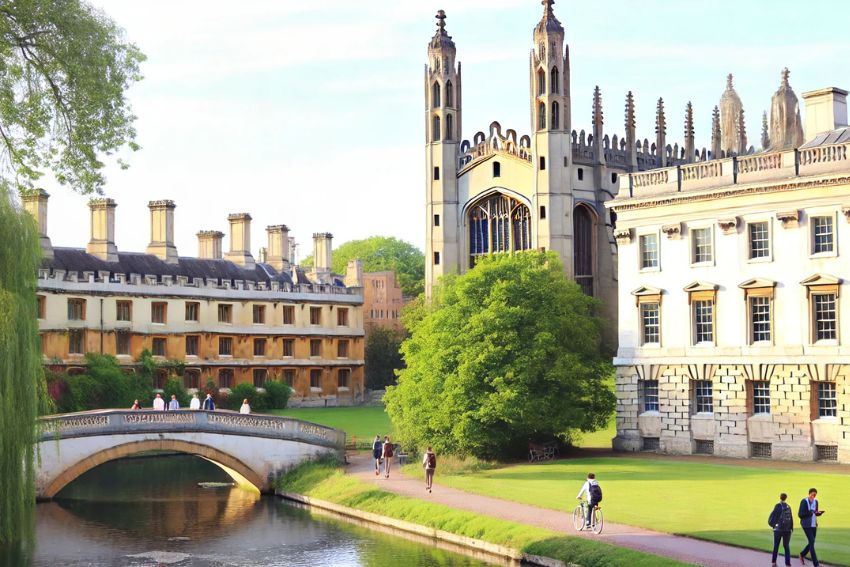The University of Cambridge stands as one of the most prestigious institutions globally, renowned for its historic contributions to education, research, and innovation. With a lineage of influential alumni and world-leading academics, Cambridge offers an unparalleled educational environment. However, gaining admission is notoriously challenging, with a highly selective acceptance rate reflecting the university’s rigorous standards. However, gaining admission is notoriously challenging, raising the question: how to get into Cambridge?
Aspiring students must not only exhibit exceptional academic prowess but also demonstrate a passion for learning and a well-rounded profile to secure a place. Therefore, we have crafted this comprehensive guide to demystify the Cambridge admissions process, providing valuable insights and support to prospective students. Moreover, by offering detailed information on application requirements, strategies for preparation, and tips for success, our aim is to empower applicants to navigate their journey with confidence and, ultimately, maximise their chances of joining this prestigious academic community.
Is It Hard To Get Into Cambridge University?
Getting into Cambridge University is highly competitive due to its reputation for academic excellence and influential alumni. Therefore, the acceptance rate is low, as the university seeks top-performing students globally. Additionally, applicants face tough competition, requiring stellar academic records, impressive personal statements, and strong interview and assessment performances.
Consequently, Cambridge’s rigorous process reflects its commitment to maintaining world-class educational standards. As a result, prospective students must demonstrate outstanding ability, dedication, and a genuine passion for their chosen field to boost their chances of admission.
The University Of Cambridge Acceptance Rate
| Acceptance Rates | 2021 | 2022 | 2023 |
| Applicants | 22,795 | 22,470 | 21,445 |
| Offers | 4,260 | 4,238 | 4,553 |
| Acceptances | 3,660 | 3,544 | 3,557 |
| Offer Rate | 18.7 | 18,9 | 21.2% |
| Acceptances Rate | 16.1 | 15,8 | 16,6% |
For Year 2024:
- Projected Applicants: ~21,000 (based on trends)
- Offers and Acceptance Rates: Expected to remain consistent with previous years, with offer rates around 20-21% and acceptance rates between 15-17%.
The trends indicate Cambridge maintains a highly selective admissions process. The slight fluctuations each year reflect changes in application numbers and subject-specific demands, but the university continues to uphold rigorous standards.
Cambridge offers remain competitive for international applicants, with particularly fierce competition for popular courses such as Economics and Medicine, where acceptance rates can drop as low as 10-15%. The data shows that preparing a strong application is essential to navigating this intense process.

What You Need to Get into Cambridge?
Getting into Cambridge is a dream for many, but it comes with specific academic requirements. Cambridge University has specific entry requirements that vary slightly by course (Check the specific details of what courses will cover), but we can show you the general components and what you’ll need to be eligible for admission:
Entry Requirements
- A-Levels: Most Cambridge courses require AAA or A*AA. The exact subjects needed will depend on the course, with some requiring specific A-levels (e.g., Mathematics for engineering). While challenging, these grades reflect your dedication and ability to handle rigorous coursework. Note that: If you are taking A Levels in science-related subjects, you’re expected to complete and pass the practical assessment.
- International Baccalaureate (IB): Typically, a score between 40-42 points is required, with 776 at Higher Level for more competitive courses. This shows your strength in areas critical to your field of study.
- Other Qualifications: Cambridge also accepts qualifications like Scottish Highers, BTECs (in combination with A-levels), and other equivalent qualifications from different countries.
If you want to success in A-level exams, our A-level online tutors can provide tailored support to strengthen your academic profile, prepare for exams, and polish personal statements, boosting your chances of getting into Cambridge.
English Language Requirements
If English isn’t your first language, you’ll need to prove you can handle the linguistic demands of your studies:
- IELTS: You’ll need an overall score of 7.5, with no component lower than 7.0.
- TOEFL IBT (internet based test): An overall score of 110 is required, with at least 25 in each section.
- EU students – proficiency in English at the C1 level in the relevant school-leaving test component
- Cambridge English: A minimum total score of 200, with no component falling below 185, is required for C2 proficiency.
- Cambridge English: C1 Advanced: approved with further proof of English proficiency and a minimum total score of 193, with no component falling below 185.
These qualifications ensure you’re ready for Cambridge’s challenging academic environment. It’s not just about meeting a checklist – it’s about showing your passion, dedication, and readiness to thrive in an inspiring community of scholars.

How to Get Into Cambridge: Application Tips
Applying to Cambridge involves several important steps, each designed to assess your academic strengths and compatibility with the university’s rigorous programs. Here’s a breakdown of what you need to know:
1. UCAS Application
- Deadline: Submit your UCAS application by the October 15th deadline.
- Personal Statement: Craft a compelling personal statement that showcases your passion for your chosen subject, academic achievements, and relevant experiences.
- Reference: Include a strong reference from a teacher or mentor who knows your academic capabilities.
3. University Tests
You may already know that, prior to an interview, the majority of tests are administered at schools or universities. Candidates must register with their assessment center well in advance of the test. When taking any tests, make sure to write down the appropriate dates.
- Course-Specific Tests: Depending on your chosen course, you may need to take additional tests. For example, the BMAT or NSAA.
- Preparation: Research the specific requirements for your course and prepare thoroughly. Practice past papers to become familiar with the format and types of questions.
For almost half of its courses, Cambridge requires applicants to take pre-interview exams. Cambridge requires students to complete a written exam for additional disciplines during their time at the institution in order to be interviewed. For at-interview assessments, you won’t need to register.
3. Interviews
All shortlisted candidates must undergo interviews, often focusing on problem-solving or discussions related to the course content. Interviews are an essential part of the Cambridge admissions process.
- Invitation: If shortlisted, you’ll be invited to attend an interview, typically held in December.
- Format: Interviews are often subject-specific and can feel like an academic conversation. They’re designed to assess your critical thinking, problem-solving skills, and enthusiasm for your subject.
- Preparation: We suggest you to engage with your subject beyond the syllabus. Consider potential questions and practice articulating your thoughts clearly.
- Remember: The interview is designed to give tutors insight into how you approach new challenges and process information. It’s not about speed or arriving at the right answer—sometimes, there may not even be one. The main focus is on understanding your reasoning and how you apply what you’ve learned, showcasing your problem-solving skills and intellectual flexibility..
4. Additional Forms
- Supplementary Application Questionnaire (SAQ): Once you’ve applied through UCAS, you’ll need to complete the SAQ, which provides the university with extra information about you.
- Further Forms: Some courses may require additional documents or written work. Check your department’s specific requirements to ensure you submit everything on time.
Successfully figuring out how to get into Cambridge requires careful planning and a true passion for your subject. By following each step thoroughly, you can demonstrate your preparedness and commitment to join one of the world’s most prestigious academic institutions
Please note:
1. To complete an extra online questionnaire My Cambridge Application, is necessary.
2. International students may face different application deadlines compared to those for UK or EU applicants. Be sure to confirm the specific dates with the relevant university.

How Important Is A Personal Statement To Get Into Cambridge?
Your personal statement offers a valuable chance to showcase how well you’ll thrive in Cambridge’s tutorial or supervision system. To stand out, go beyond the standard exam syllabus and highlight your dedication to your subject and your ability to study independently. Use this space to express your ambition, showing how you organise, structure, and research your work. Make sure to connect these skills to the demands of your chosen course.
Additionally, keep in mind that your personal statement may need to fit several different courses, as UCAS allows you to apply to up to five universities. Balancing specificity with flexibility will help ensure your application resonates across all your chosen programs.
Additional Considerations
When figuring out how to get into Cambridge University, it’s important to understand that some applicants may need to take the STEP (Sixth Term Examination Paper), especially for mathematics-related courses. Additionally, Cambridge recognises that personal circumstances can impact academic performance. To ensure fairness, the university considers these factors through a process known as contextualization.
While academic achievements remain the primary focus, contextualization allows Cambridge to assess other elements, such as your socioeconomic background, school performance, and additional challenges you may have faced. Teachers or advisers can submit an Extenuating Circumstances Form to provide further details about any difficulties, ensuring that all relevant aspects are considered during the admissions process.
How To Transfer To Cambridge From Another University?
Cambridge usually doesn’t accept applications from students who are already studying at another UK university. However, they might make an exception if:
- You’re dealing with exceptional circumstances
- You’re looking to switch to a different subject
If you fall into one of these categories, you’ll need:
- Strong support from your current course director
- A reference or letter of support sent to the Cambridge College you apply to
- To go through the same admissions process as everyone else
Keep in mind that if you do transfer, you’ll need to start your course from the first year—Cambridge doesn’t allow credit transfers from other universities. Also, having studied elsewhere could affect your eligibility for student loans or a student Visa.
Notes For International Students To Get Into Cambridge
If you are an international applicant you should be aware that, for some visa types, UK Visas and Immigration (UKVI) requires a Secure English Language Test (SELT) such as ‘IELTS for UKVI (Academic)’. However, under UKVI policy, as a Higher Education Provider (HEP), they can accept other English language qualifications when sponsoring a student visa.
If you take an approved English language test to meet the English language requirements:
- The test is only valid for visa purposes for two years from the date of the exam
- The results should still be valid on your first day of your Cambridge course
- The component scores should normally be achieved in a single sitting of the test.
How To Get Into Cambridge If I’m Underage?
If you’ll be under 18 when you start your studies, it’s a good idea to contact the College Admissions Office early to discuss your situation and application. For those applying to Medicine, make sure to check the specific age requirements on the Medicine course page to avoid any surprises.
If you’ll be under 16 when you enroll, there could be extra rules and conditions you’ll need to follow to comply with legal requirements
Conclusion
Securing a place at the University of Cambridge is undoubtedly a challenging journey that requires dedication, strategy, and thorough preparation. With its demanding entry requirements and competitive selection process, applicants must demonstrate academic excellence, passion for their chosen subject, and strong personal attributes.
Figuring out how to get into Cambridge can feel overwhelming, but the right support makes all the difference. Online tutors provide personalized help, guiding you through entrance exams, interviews, and personal statement preparation. With their assistance, you’ll develop the confidence and focus needed to navigate the admissions process successfully.
By combining strategic planning with expert guidance, you’ll enhance your ability to meet Cambridge’s high standards and take a significant step toward joining one of the world’s most prestigious universities. We hope our comprehensive guide was helpful for you and you can get ready effectively for the Cambridge University!
Other Topics You May Be Interested:
How to Get into Oxford University
10 Secrets to Getting into Top University in the UK
The Best Medical Schools in the UK









